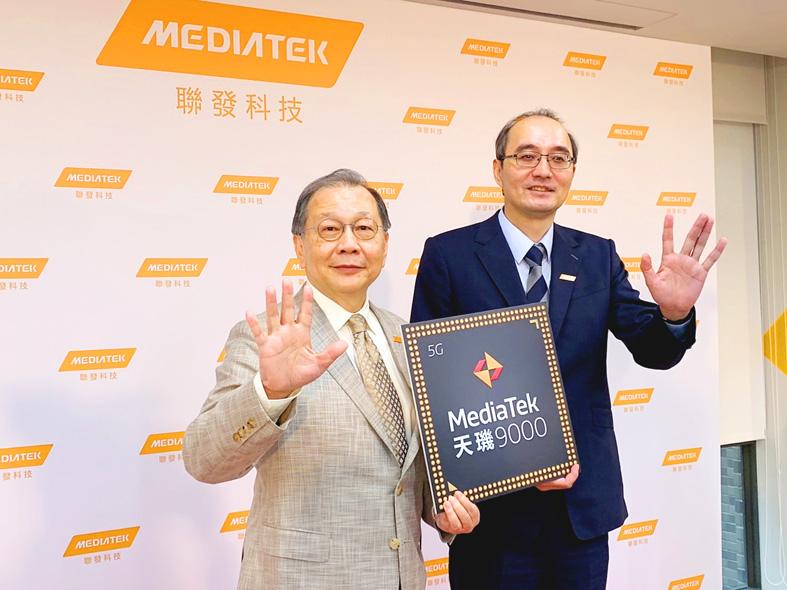MediaTek Inc (聯發科) expects revenue to grow as much as 19 percent annually over the next five years, outpacing the semiconductor industry’s overall expansion, the company said yesterday.
“Growth momentum will be sturdy in the next five years,” MediaTek vice chairman and CEO Rick Tsai (蔡力行) told a media briefing in Taipei. “For MediaTek, mid-to-high-teens percentage growth should be accessible.”
Growth would come from across the board, as the company has diverse product lines that include Internet of Things applications, and smart home and power management chips, he said.

Photo: Vanessa Cho, Taipei Times
MediaTek expects revenue to skyrocket 60 percent to US$17 billion this year, greatly surpassing an estimated annual growth of 25 percent for the global chip industry.
The milestone of reaching US$20 billion in revenue is just around the corner, the company said.
The Hsinchu-based chip designer attributed this year’s strong growth to market share gains in 5G mobile phone chips.
MediaTek has invested more than NT$100 billion (US$3.59 billion) in 5G development in the past four to five years, thanks to which it seized about 40 percent of the global market share in 5G smartphone chips, it said.
Two in five 5G smartphones sold worldwide are powered by MediaTek’s Dimensity chips, the company added.
The company expects its mobile phone chips business to grow 113 percent annually this year, the quickest growth among its four major business segments, it said.
The segment would make up about 56 percent of overall revenue this year, MediaTek said.
However, the company still faces challenges, as the COVID-19 pandemic has upended the semiconductor supply chain and caused chip supply bottlenecks, it said.
MediaTek said it has been in advanced discussions with Taiwan Semiconductor Manufacturing Co (TSMC, 台積電), and its chip packaging and testing partners over chip supply for next three to four years.
“The supply from our vendors is mostly done for next year,” Tsai said. “No matter how good the technology you develop, it will be in vain if you do not have chip supply.”
Due to a shortage of chip subcomponents, Qualcomm Inc struggled to keep up with the demand for its smartphone chips earlier this year.
Smartphones powered by MediaTek’s first flagship 5G chip, the Dimensity 9000, would hit the stores in the second quarter of next year, the company said.
The new chip only supports sub-6-gigahertz frequencies, rather than high-band millimeter-wave frequencies.
The company’s competitors have said that MediaTek’s technology is therefore inferior.
MediaTek president Joe Chen (陳冠洲) said that the dispute over frequencies did not stop its clients from adopting the new chip, adding that the firm has been in discussions with clients throughout the design process.
The sub-6-gigahertz spectrum remains the most popular 5G band, Chen said.
The company expects its first 5G chip supporting the millimeter-wave spectrum to hit the market next year, as it has passed the qualification for a potential customer, a telecom in the US, Chen said.

In Italy’s storied gold-making hubs, jewelers are reworking their designs to trim gold content as they race to blunt the effect of record prices and appeal to shoppers watching their budgets. Gold prices hit a record high on Thursday, surging near US$5,600 an ounce, more than double a year ago as geopolitical concerns and jitters over trade pushed investors toward the safe-haven asset. The rally is putting undue pressure on small artisans as they face mounting demands from customers, including international brands, to produce cheaper items, from signature pieces to wedding rings, according to interviews with four independent jewelers in Italy’s main

Macronix International Co (旺宏), the world’s biggest NOR flash memory supplier, yesterday said it would spend NT$22 billion (US$699.1 million) on capacity expansion this year to increase its production of mid-to-low-density memory chips as the world’s major memorychip suppliers are phasing out the market. The company said its planned capital expenditures are about 11 times higher than the NT$1.8 billion it spent on new facilities and equipment last year. A majority of this year’s outlay would be allocated to step up capacity of multi-level cell (MLC) NAND flash memory chips, which are used in embedded multimedia cards (eMMC), a managed

Japanese Prime Minister Sanae Takaichi has talked up the benefits of a weaker yen in a campaign speech, adopting a tone at odds with her finance ministry, which has refused to rule out any options to counter excessive foreign exchange volatility. Takaichi later softened her stance, saying she did not have a preference for the yen’s direction. “People say the weak yen is bad right now, but for export industries, it’s a major opportunity,” Takaichi said on Saturday at a rally for Liberal Democratic Party candidate Daishiro Yamagiwa in Kanagawa Prefecture ahead of a snap election on Sunday. “Whether it’s selling food or

In the wake of strong global demand for AI applications, Taiwan’s export-oriented economy accelerated with the composite index of economic indicators flashing the first “red” light in December for one year, indicating the economy is in booming mode, the National Development Council (NDC) said yesterday. Moreover, the index of leading indicators, which gauges the potential state of the economy over the next six months, also moved higher in December amid growing optimism over the outlook, the NDC said. In December, the index of economic indicators rose one point from a month earlier to 38, at the lower end of the “red” light.